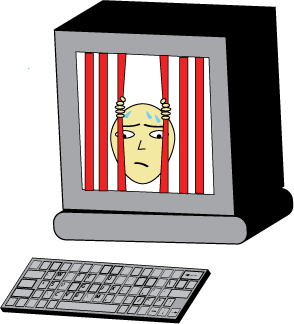
by Tiffanie Clippinger, Bethany Goshorn, and Caitlin Rutman
Am I Addicted to the Internet?
Specific Addictions
Addiction to CyberRelationships
More Information
Treatment of InternetAddiction
Helpful Links
Center for Internet Addiction Recovery
PsychCentral-Internet Addiction Guide
Although lacking DSM-IV-TR criteria, Internet addiction has shown to be a serious condition. Symptoms of excessive Internet use can be similar to those of traditional substance addictions, leading to a rising concern in the possibility of users becoming addicted to the Internet. There are two different approaches to Internet addiction. Some researchers hold that “Internet” replaces the term “substance” in terms of addiction analysis and its effects on the user. Internet addicts can experience salience, mood modification, tolerance, withdrawal, conflict, and relapse just like substance addicts. Other researchers believe that Internet addiction is more of an obsessive and compulsive behavior, similar to disorders without a chemical dependence (such as compulsive shopping). Because of a lack of reliable research and support for both concepts, there is no standard, absolute definition of Internet addiction (Brian et. al., 2005). Greenfield outlines several factors that do not necessarily make the Internet addictive but do make it attractive. These include feelings of intense intimacy, disinhibition, a loss of boundaries, timelessness, and being out of control (Widyanto & Griffiths, 2007).
Psychologist Kimberly Young, Ph.D., has outlined these warning signs of Internet addiction:
- Spending more time on the Internet than you intended
- Feeling that you can’t resist the temptation to go online
- Neglecting daily activities, responsibilities, and relationships (such as chores, exercise, work, social events, etc.) in favor of the Internet
- Being online at least 38 hours per week
- An inability to restrict Internet usage
- Having feelings of dysphoria (negative feelings such as anxiety or stress) which are replaced by feelings of euphoria (positive feelings such as happiness or tranquility) while/after using the Internet (Potera, 1998)
Studies have been done that suggest that problematic Internet use co-occurs with various other psychological conditions and personality traits. However, it is unclear as to whether these traits, characteristics, and conditions are a cause of problematic Internet use or if they are a result of it (Widyanto & Griffiths, 2007).
Mark Griffiths proposes that Internet addiction is a present problem for only a small number of people. He defines addictions to the Internet as those behaviors which can only be engaged in online, done to an excess. Such behaviors might include engaging in fantasy role-playing games online, taking on different personas and otherwise experimenting with one’s social identity online. Griffiths’ definition of Internet addiction would not include shopping, gambling, pornography, and other addictive behaviors which can exist in the absence of the Internet. More commonly, Griffiths suggests, the Internet simply facilitates and fuels various other addictions. Griffiths insists that researches first must agree upon their definition of Internet addiction in order for their studies to yield more helpful information (Widyanto & Griffiths, 2007).
Research to date has been helpful in creating a loose psychological profile of people who suffer from Internet addiction or excessive Internet use. Some effects of abundant Internet use might include neglect of responsibilities and neglect of family, social, and occupational obligations. Those with problematic Internet use and Internet addiction have been found to exhibit symptoms of depression; however, it is still unclear if depression is a cause or an effect of Internet use. Though more research is needed in this area, psychologists have learned enough about the causes, dynamics, and effects of problematic Internet use to determine reasonably effective treatment plans.

